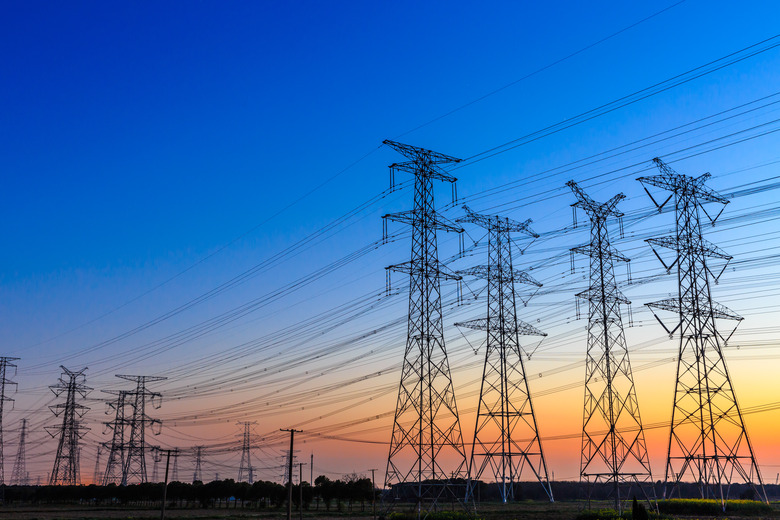10 Questions About Electricity
Matter is composed of atoms with a nucleus containing protons and neutrons. Electricity is created by an interruption in the balance of positively charged protons and negatively charged electrons. This causes the release and free movement of an electron and creates an electric current.
Who Discovered Electricity?
Who Discovered Electricity?
Benjamin Franklin conducted early experiments with lightning and electricity. In 1800, Italian physicist Alessandro Voltra invented the first electric battery and discovered the role of positive and negative connectors and voltage. Michael Faraday, an English scientist, invented the electric dynamo, the first power generator in 1831. Thomas Edison followed in 1879 with the first lightbulb.
How Is Electricity Used?
How Is Electricity Used?
Electricity provides the power on the earth and in space. Electricity runs heaters and air conditioners, lighting systems, water pumps and electronic devices. Electric generators churn out millions of watts to operate hospital equipment, run printing presses and light billions of miles of highways.
What Is a Power Generator?
What Is a Power Generator?
Electric generators convert mechanical power into electrical power with a stationary conductor and wire conduit. An electric current is generated as wires cross a magnetic field. Generators contain a turning shaft with an attached magnet. A stationary conducting ring, wrapped in a continuous wire, contains the shaft. The rotating magnet produces the electric current.
How Is Power Measured?
How Is Power Measured?
Power is measured in watts, which are units of energy. A kilowatt is 1,000 watts. Consumer and commercial electricity is measured in kilowatt-hours, which is the same as 1,000 watts working for one hour.
Why Was the Transformer Invented?
Why Was the Transformer Invented?
In the past, homes and businesses far from the local power plant could not receive electrical power. In 1886, George Westinghouse and William Stanley invented the transformer to transmit long-distance power. Transformers conduct, alter or modify electrical currents and transfer power through electromagnetic induction between circuits at the same frequency.
What Is Voltage?
What Is Voltage?
The electromotive force (EMF) is the pressure that moves electrons within a conductor. The EMF is measured in voltage. An imbalance in the electrostatic charge causes electrons to flow from one point to the next. This voltage represents the difference in the electrostatic charge between two points.
Is Electricity Used in the Human Body?
Is Electricity Used in the Human Body?
Your brain dispatches millions of electrical signals along the nerves in your central nervous system. These nerves connect with your muscles and provide the power to complete an action or movement. These electrical signals enable you to brush your teeth, eat a meal and run off extra calories.
Why Is Lightning Dangerous?
Why Is Lightning Dangerous?
One lightning bolt contains 30 million volts of electricity. Stay indoors during a thunderstorm and avoid corded devices and the bathtub and sink, as wiring and water pipes can conduct lightning. Do not stand near metal bleachers, poles or trees or other tall objects if you are outdoors.
What Are Some Careers in Electricity?
What Are Some Careers in Electricity?
Electrical plants hire workers as power plant operators to manage turbines, generators and boilers. Power distributors regulate electricity and steam distribution. Line installers and repairers work outdoors and install poles and the electrical components for conducting electricity. These workers repair cables and wires. Industrial machine installers troubleshoot and repair power and water treatment plant equipment.
What Are Some Power Sources Other Than Electricity?
What Are Some Power Sources Other Than Electricity?
Solar power comes from the sun's energy. Photovoltaic cells harness sunlight or energy to produce power for businesses and homes. A wind turbine harnesses energy from the wind to provide power. Underground thermal heat energy creates geothermal energy. Biomass fuels produce steam or other liquids or gases for power. Biomass energy is harnessed from organic matter such as wood, animal waste, plants and crops.
Cite This Article
MLA
Ritter, Carolyn. "10 Questions About Electricity" sciencing.com, https://www.sciencing.com/10-questions-about-electricity-13659669/. 22 January 2019.
APA
Ritter, Carolyn. (2019, January 22). 10 Questions About Electricity. sciencing.com. Retrieved from https://www.sciencing.com/10-questions-about-electricity-13659669/
Chicago
Ritter, Carolyn. 10 Questions About Electricity last modified March 24, 2022. https://www.sciencing.com/10-questions-about-electricity-13659669/
